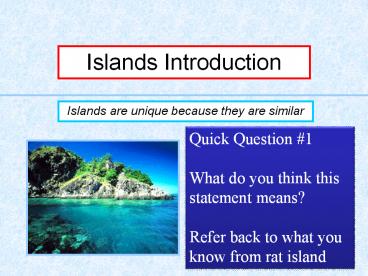Islands Introduction - PowerPoint PPT Presentation
Title:
Islands Introduction
Description:
Title: PowerPoint Presentation Author: Redwood High School Last modified by: Ginsburg, John Created Date: 8/20/2003 7:57:44 PM Document presentation format – PowerPoint PPT presentation
Number of Views:437
Avg rating:3.0/5.0
Title: Islands Introduction
1
Islands Introduction
Islands are unique because they are similar
Quick Question 1 What do you think this
statement means? Refer back to what you know
from rat island
2
I. Islands Unit Overview
- The Story
- This unit is about both biological and geological
evolution. - Islands provide interesting, unusual examples of
evolutionary change on a scale that is small and
easy to understand. - While the results of island evolution tend to be
very different from evolution on a continental
landmass, the mechanisms are the same. Islands
simply become the context to learn evolutionary
mechanisms.
3
Quick Question 2 Give your best definition of
an island
4
II. What is an Island?
A. Definition Islands are isolated environments
with unique living organisms (biology) and unique
physical characteristics (geology)
III. Why Do We Study Islands?
- Islands are unique because they are similar
- Islands are dynamic and often experience change,
both biologically and geologically, more rapidly
than continental landmasses - Islands are smaller than continents, therefore
easier to study. - Islands allow us to study two major themes in
science Evolution (Biological Science) and Plate
Tectonics (Earth Science).
IV. What Happens to Organisms on Islands Over
Time?
- Migrate, Survive, Reproduce, Adapt, Evolve or Go
Extinct
5
Quick Question 3 Predict at least two ways an
Island can form
6
V. How Do Islands Form?
- a. Rising Sea Level
- b. Emerging Coral Reefs (Hot Spots)
- c. Volcanism
7
a. Rising Sea Level
V. How Do Islands Form?
- As the sea level rises due to changes in
climateland masses that were once connected are
now isolated from one another
8
b. Emerging Coral Reefs
V. How Do Islands Form?
- Coral Polyps and other marine animals build a
house of limestone around themselves for
protection - If the sea level drops or if the land underneath
rises (hot spots), then coral reefs become
exposed on the surface - Sand and dust accumulate on the reef to form an
island
9
c. Volcanism
V. How Do Islands Form?
- Underwater volcanoes erupt
- As hot lava is emitted from the volcano, it cools
and hardens to form large land masses on the
waters surface (islands)
10
Quick Question 4 Compare and Contrast the three
ways islands can be formed.
11
VI. What Does Origin of the Island Affect?
- Soil type and composition
- Mineral resources
- Available groundwater
- Ultimatelyall life on and around the island
12
You do not need to take notes on the next 4
slides/subjects
VII. Effects on species are unique on islands
13
VII. Effects on species are unique on islands
- Species on islands are unique.
Quick Question 5 Predict why all these species
grew so large in size on their islands
Elephant Bird - Madagascar
Giant burrowing cockroach - Australia
Giant Galapagos Tortoise - Galapagos
Moa
14
VII. Effects on species are unique on islands
- Species on islands are unique.
Kiwi Bird - New Zealand
Quick Question 6 Predict why these bird species
lost their ability to fly
15
VII. Effects on species are unique on islands
- Species on islands are unique.
Quick Question 7 Predict why all these species
evolved their traits on their islands
Pygmy hippopotamus Madagascar (nocturnal)
Rattleless rattlesnake - Santa Catalina Island
Tree climbing kangaroo - New Guinea
16
VII. Effects on species are unique on islands
- Species on islands are unique.
Tasmanian devil - Tasmania
Komodo dragon - Komodo Island
17
VIII. Causes of Uniqueness Are Similar on Islands
- The mechanisms that cause islands to be unique
- Dispersal Ability how good a species are at
migrating to new locations - Size Change - organisms are larger or smaller
than normal - Loss of Dispersal Ability - species easily lose
ability to emigrate - Endemism - species tend to evolve and remain
native to that area only
18
VIII. Causes of Uniqueness Are Similar on
Islands (CONT)
- The mechanisms that cause islands to be unique
- Relictualism - populations are small and have a
greater chance of extinction - Loss of Defensive Adaptations - defense
capabilities are reduced in predator-free
environments - Archipelago Speciation - many species may evolve
from one in the same island group - Adaptive Radiation - many species may evolve from
one in the same location because they use
different parts of the habitat
19
Speciation!
IX. What mode of evolution is repeatedly shown
through the study of Islands?
- First What Makes a species?
- A group of individuals that can interbreed in
nature. - Definition of Speciation The evolutionary
formation of new biological species, usually by
the division of a single species into two or more
genetically distinct ones.
20
x. Speciation Can occur through
- Geographic Isolation
- Temporal (season/time) Isolation
- Behavioral isolation
21
Speciation Bottom Line
XI. Speciation
- Animals and plants adapt to their new environment
- Speciation occurs when organisms undergo
Reproductive Isolation (where they can no longer
interbreed).
22
XII. Two main things happen that drive evolution
- Natural Selection - Best Fit Survive
- Ex. Camouflage, size, speed, adaptations, sex
appeal, strength, intelligence, predictable human
impact etc. - Genetic Drift - Lucky Survive
- Ex. Extreme weather, isolation, epidemic
diseases, genetic mutations, unequal gender
balance, geologic activity etc.































